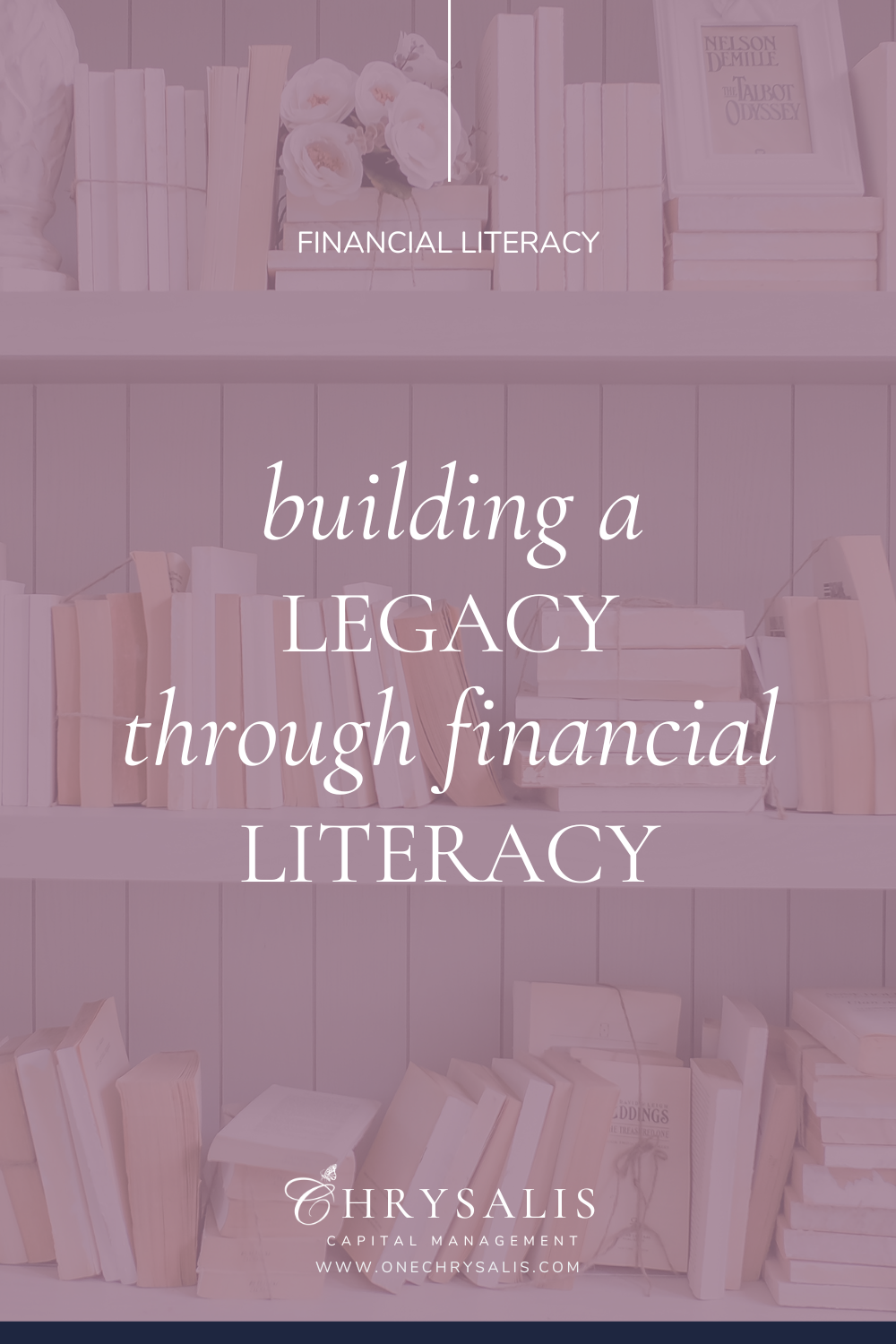
FINANCIAL LITERACY
Building a Legacy Through Financial Literacy
Quick Synopsis:
Align your finances with your values to build a lasting legacy. Discover how to set financial goals, invest responsibly, engage in philanthropy, and teach financial literacy to future generations. Learn tips for conscious spending and regularly reviewing your financial plan to ensure it reflects your evolving values. Start building a meaningful financial legacy today.
Align Your Finances With Your Core Values
In today’s fast-paced world, where financial decisions impact every aspect of our lives, aligning your money with your values is more important than ever.
If you’re a legacy builder—those who aspire to create a lasting impact through their financial choices—understanding how to put your money where your values are is crucial. This approach not only fosters personal fulfillment but also sets the stage for future generations to follow.
In this blog post, we’ll explore how you can build a legacy by aligning your financial decisions with your core values, ensuring a positive and enduring impact.
Understanding Your Core Values
Before you can align your finances with your values, it’s essential to identify what those values are. Core values are the fundamental beliefs that guide your actions and decisions. They can include things like:
- Integrity: Being honest and having strong moral principles.
- Family: Prioritizing family well-being and spending quality time together.
- Sustainability: Protecting the environment and promoting sustainable practices.
- Community: Supporting and contributing to the well-being of your local community.
- Education: Valuing knowledge and lifelong learning.
Take some time to reflect on what matters most to you. Write down your top values and think about how they influence your daily decisions. This clarity will serve as a foundation for making financial choices that align with your beliefs.
Setting Financial Goals That Reflect Your Values
Once you’ve identified your core values, the next step is to set financial goals that reflect them. These goals should be specific, measurable, attainable, relevant, and time-bound (SMART). Here are some examples:
- Value: Sustainability Goal: Allocate 10% of your investment portfolio to companies with strong environmental practices within the next year.
- Value: Education Goal: Save $50,000 for your children’s college education within the next 10 years.
- Value: Community Goal: Donate $5,000 annually to local charities that support underprivileged families.
By setting goals that resonate with your values, you create a roadmap for making financial decisions that are both meaningful and impactful.
Aligning Investments With Your Values
Investing is a powerful tool for building wealth and securing your financial future. However, it’s also an opportunity to put your money where your values are. Socially responsible investing (SRI) and environmental, social, and governance (ESG) investing are strategies that allow you to support companies and initiatives that align with your beliefs.
Socially Responsible Invest (SRI)
SRI involves selecting investments based on ethical, social, and environmental criteria. For example, you might choose to invest in companies that promote clean energy, human rights, and fair labor practices. Conversely, you might avoid investing in industries like tobacco, firearms, or fossil fuels.
Environmental, Social, and Governance (ESG) Investing
ESG investing focuses on three main factors:
- Environmental: Companies that engage in sustainable practices, reduce carbon footprints, and protect natural resources.
- Social: Companies that foster diversity, equity, and inclusion, and that have positive labor practices.
- Governance: Companies with transparent and ethical business practices, strong leadership, and accountable governance structures.
By incorporating SRI and ESG criteria into your investment strategy, you can grow your wealth while supporting causes that matter to you.
Charitable Giving and Philanthropy
For legacy builders, charitable giving and philanthropy are powerful ways to align your finances with your values. Donating to causes you care about not only provides immediate support to those in need but also sets an example for future generations. Here are some ways to integrate philanthropy into your financial plan:
- Regular Donations: Set up monthly or annual donations to your favorite charities. This consistent support can make a significant difference over time.
- Donor-Advised Funds (DAFs): DAFs allow you to make a charitable contribution, receive an immediate tax deduction, and recommend grants from the fund over time. This flexibility lets you support various causes while optimizing your tax benefits.
- Legacy Gifts: Consider leaving a portion of your estate to charity through your will or a trust. This ensures your values continue to make an impact even after you’re gone.
Teaching Financial Literacy to Future Generations
Building a legacy isn’t just about what you do with your money—it’s also about educating future generations on the importance of financial literacy and value-based financial decisions. Here are some ways to pass on this knowledge:
- Open Discussions: Have regular conversations about money, values, and financial goals with your family. Transparency helps demystify financial concepts and fosters responsible money management.
- Educational Resources: Provide books, courses, and tools that teach financial literacy. Encourage your children and grandchildren to learn about budgeting, investing, and charitable giving.
- Lead by Example: Demonstrate how you align your financial decisions with your values. Your actions will speak louder than words and inspire your family to follow in your footsteps.
Making Conscious Spending Choices
Your daily spending habits can also reflect your values. Consider the impact of your purchases on the environment, society, and your community. Here are some tips for conscious spending:
- Support Local Businesses: Shop at local stores and markets to support your community’s economy.
- Choose Sustainable Products: Opt for eco-friendly and ethically sourced products to reduce your environmental footprint.
- Prioritize Quality Over Quantity: Invest in high-quality items that last longer, reducing waste and the need for frequent replacements.
Making Regularly Review and Adjust Your Financial Plan
Aligning your finances with your values is an ongoing process. Regularly review your financial plan to ensure it continues to reflect your evolving values and goals. Life changes, such as marriage, the birth of a child, or retirement, may require adjustments to your plan.
Conclusion
Putting your money where your values are is a powerful way to build a lasting legacy. By understanding your core values, setting aligned financial goals, investing responsibly, engaging in philanthropy, teaching financial literacy, making conscious spending choices, and regularly reviewing your financial plan, you can ensure that your financial decisions reflect what matters most to you.
This approach not only provides personal fulfillment but also creates a positive impact that extends to future generations. Start today and pave the way for a financially secure and values-driven legacy.
Need help defining your core values?
Download our workbook to get started on your journey to value-based financial planning!
About Us
At Chrysalis Capital Management, we’re committed to helping you embrace the abundance mindset as a cornerstone of your financial success. Through personalized coaching and resources, we guide you in aligning your mindset with your financial goals, helping you make empowered decisions that pave the way for a prosperous and fulfilling future.


I’m Stephanie
I empower women to achieve true financial freedom through expert wealth guidance and personalized coaching.
I’m not your typical financial advisor, I’m committed to redefining the way you approach wealth management. No more jargon filled, stuffy financial tasks – I’m all about making finances as exciting as that perfect getaway vacation.
Welcome!

Are You Financially Fit?
Test your financial fitness level with this 3 minute quiz!
TOP CATEGORIES

Financial Planning
Explore essential topics like budgeting, goal setting, and debt management to achieve financial security and peace of mind.

Investment Strategies
Dive into the world of investments, from understanding different asset classes to crefting effective investment strategies for wealth growth.

Retirement Planning
Discover insights and tips to ensure a comfortable and worry-free retirement, covering retirement income, savings plans, and financial security.

